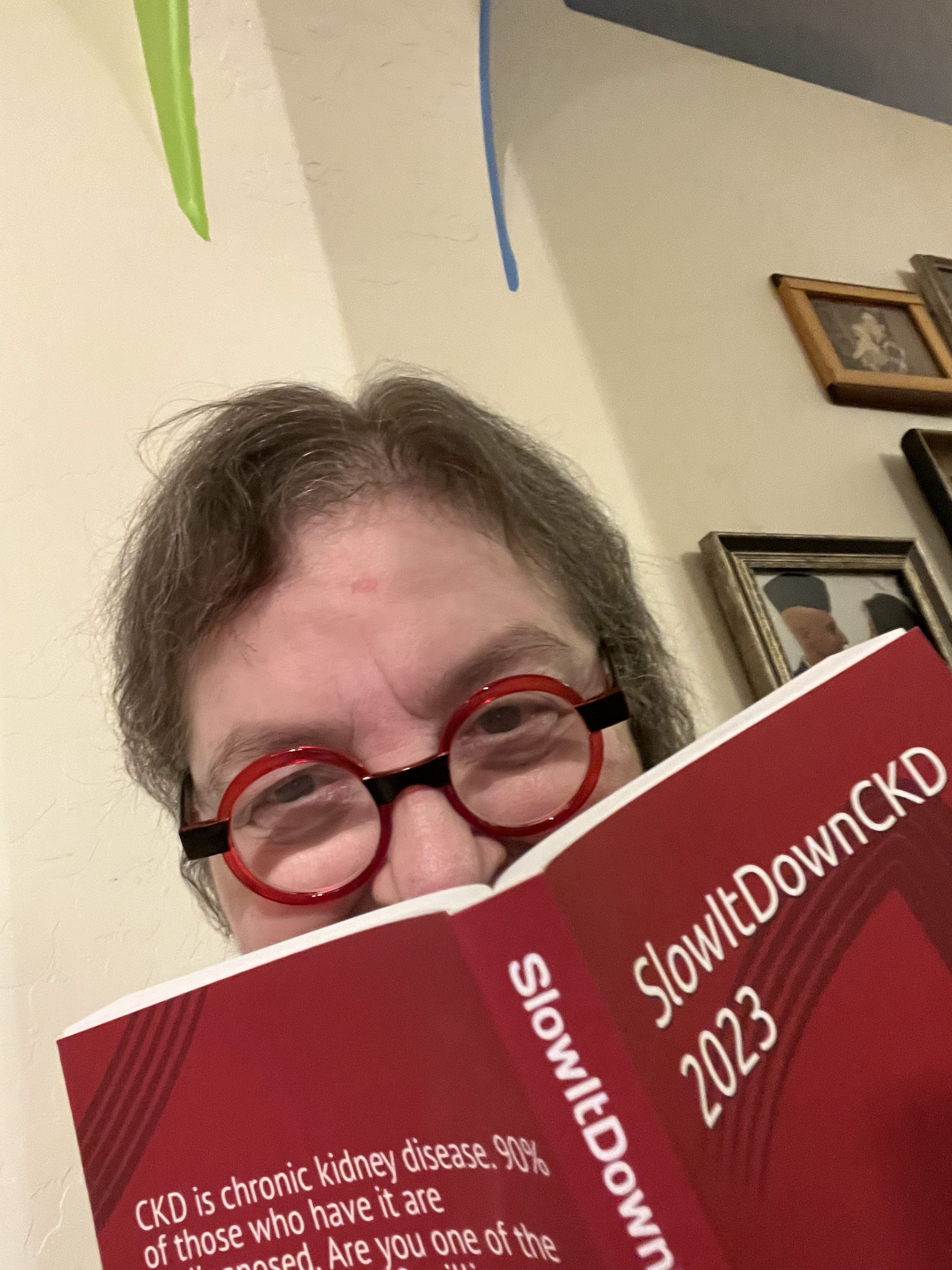6/10 Not Fair!
One of my buddies texted to tell me that he is taking Ozempic. He had lost 40 pounds and is off insulin. In addition, his kidney numbers are back to normal. It’s having a positive effect on his heart, too. I want these results. I want to take this miracle drug, too. But I can’t.
The injectable drug Ozempic is shown Saturday, July 1, 2023, in Houston. (AP Photo/David J. Phillip)
” data-medium-file=”https://gailraegarwood.wordpress.com/wp-content/uploads/2024/06/download-16.jpg?w=300″ data-large-file=”https://gailraegarwood.wordpress.com/wp-content/uploads/2024/06/download-16.jpg?w=470″ width=”1024″ height=”682″ src=”https://renal.platohealth.ai/wp-content/uploads/2024/06/6-10-not-fair.jpg” alt class=”wp-image-7387″ style=”width:306px;height:auto”>
According to Healthline,
“’It should be avoided in many populations, including but not limited to people with a history of pancreatitis, people who have had medullary thyroid cancer or who are at increased risk for medullary thyroid cancer,’ Seltzer says.”
Seltzer is “Dr. Charlie Seltzer, a Philadephia [stet]-based physician with board certifications in obesity and internal medicine.”
You may remember I had pancreatic cancer almost five years ago. That left me with a quarter of my pancreas [but I’m alive!]. As I understand it, this surgery can cause pancreatitis. Having [and still having] trouble losing weight, I mentioned this drug to my wonderful oncologist. His response was negative. He told me of the side effects I might encounter which sounded pretty bad to me.
But wait, I am so getting ahead of myself. I haven’t even explained what Ozempic is yet. I turned to their website for the information I needed:
“OZEMPIC® is an injectable prescription medicine used:
• along with diet and exercise to improve blood sugar (glucose) in adults with type 2 diabetes mellitus.
• to reduce the risk of major cardiovascular events such as heart attack, stroke or death in adults with type 2 diabetes mellitus with known heart disease.
It is not known if OZEMPIC® can be used in people who have pancreatitis.
OZEMPIC® is not for use in people with type 1 diabetes.
It is not known if OZEMPIC® is safe and effective for use in children under 18 years of age.”
You may have heard about semaglutide, rather than Ozempic. Drugs.com tells us:
“Semaglutide is the active ingredient in Ozempic, Wegovy, and Rybelsus. Semaglutide is used for weight loss in specific patients, and also to lower blood sugar levels, and to reduce the risk of major cardiovascular events such as heart attack or stroke in certain patients. Semaglutide is a GLP-1 agonist that works by increasing insulin release, lowering the amount of glucagon released, delaying gastric emptying, and reducing appetite.”
I wasn’t sure what a GLP-1 agonist was, so I looked it up on the National Library of Medicine:
“Glucagon-like peptide-1 (GLP-1) agonists are a class of medications utilized to treat type 2 diabetes mellitus (T2DM) and obesity.”
Photo by Towfiqu barbhuiya on Pexels.com
” data-medium-file=”https://renal.platohealth.ai/wp-content/uploads/2024/06/6-10-not-fair-1.jpg?w=300″ data-large-file=”https://renal.platohealth.ai/wp-content/uploads/2024/06/6-10-not-fair-1.jpg?w=470″ width=”1880″ height=”1253″ src=”https://renal.platohealth.ai/wp-content/uploads/2024/06/6-10-not-fair-1.jpg” alt class=”wp-image-7389″ style=”width:239px;height:auto”>
By now, I was certain it wasn’t fair that I couldn’t take this drug. But, hey, as I said before – I’m alive.
Do you remember what glucagon is? I didn’t, although I supposed it had something to do with sugar. WebMD informed me I got that part right, but here’s the rest of it:
“Glucagon works with your liver to turn a type of stored sugar called glycogen into glucose. Glucose goes from your liver into your blood to give you energy.
Glucagon can tell your liver not to take in too much glucose from the food you eat and to release stored sugar into your blood instead. This can keep your glucose levels steady.
If your blood sugar dips too low, your pancreas releases glucagon to tell your liver to make more glucose.
Glucagon can also play a role in how amino acids (compounds that help make up muscles and tissue in your body) make glucose. And it can break down triglycerides, or fat your body stores, into fuel.”
I get it how intertwined all these processes are now… and why I can’t take Ozempic. Let’s take a look at the other possible side effects. Thank you to Good Rx Health for this material:
“Common semaglutide (Wegovy, Ozempic, Rybelsus) side effects include nausea and vomiting, diarrhea, and stomach pain. Fatigue, constipation, and headaches are also possible. Most digestion-related side effects improve over time as your body gets used to the medication.
More severe semaglutide side effects, such as pancreatitis, gallbladder disease, and kidney damage are rare. But it’s important to know what to look for and when to get medical attention.”
I kept reading about Ozempic face but had no idea what that was, either. Medical News Today explained:

“Facial fat serves a protective function and affects facial aesthetics and elasticity. Weight loss can cause dermatological changes and shrinking because the fat that stretches and cushions the skin is no longer in place.
The skin of the face also loses its ability to retract after an episode of rapid weight loss due to reduced levels of elastin and collagen, which are essential for structural integrity.
As a result, people taking Ozempic may report the following facial symptoms:
- increased signs of aging, such as more lines and wrinkles
- loss of fat, which can lead the skin to become loose and sag
- a hollowed-out appearance
- lipodystrophy, which affects how the body accumulates and stores fat”
I wonder if I’m writing so much about the side effects out of ‘sour grapes’? Let’s see what else I can find on the positive side. Let’s go back to Medical News Today for a minute:
“GLP-1 agonist diabetes drugs have found a second use as weight-loss medications. Now, a new study from electronic medical records company Epic reports that their use also corresponds to a reduction in depression and anxiety.
Five GLP-1 drugs were linked to reduced depression and anxiety in people with diabetes, compared with people who were not taking GLP-1 medications.”
Remember I called Ozempic a miracle drug in the beginning of today’s blog? Here’s why:
promotes weight loss in specific patients
lowers blood sugar levels
reduces the risk of major cardiovascular events such as heart attack or stroke in certain patients
reduces risk of depression and anxiety.

As an adult with obesity, depression, and high glucose, I would take a chance on this FDA approved drug… if I could. And that’s not even with cardiovascular problems. I’m not endorsing the drug, only saying I personally would try it.
Until next week,
Keep living your life!
- Anxiety
- Blood Glucose
- Cardiovascular
- Cardiovascular disease
- depression
- Diabetes
- Diabetes Meliltus
- Drugs.com
- Glucose
- Heart
- Heart Attack
- Medical News Today
- Medications
- National Library of Medicine
- obesity
- Ozempic
- Ozempic Face
- Semaglutide
- Sodium-glucose transport protein 2
- Stroke
- Uncategorized
- Weight
on June 10, 2024 at 10:45 am
Leave a Comment
Tags: SlowItDownCKD 2011, SlowItDownCKD 2012, SlowItDownCKD 2013, SlowItDownCKD 2014, SlowItDownCKD 2015, SlowItDownCKD 2016, SlowItDownCKD 2017, SlowItDownCKD 2018, SlowItDownCKD 2019, SlowItDownCKD 2020, SlowItDownCKD 2021, SlowItDownCKD 2022, SlowItDownCKD 2023, SlowItDownCKD podcasts
![]()
The URI to TrackBack this entry is: https://gailraegarwood.wordpress.com/2024/06/10/6-10-not-fair/trackback/
- The Renal Warrior Project. Join Now
- Source: https://gailraegarwood.wordpress.com/2024/06/10/6-10-not-fair/
